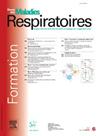CBNPC sans addictions oncogéniques métastatique cérébral d’emblée : place de l’immunothérapie
IF 0.5
4区 医学
Q4 RESPIRATORY SYSTEM
引用次数: 0
Abstract
Introduction
Environ 30 % des patients atteints d’un cancer pulmonaire non à petites cellules (CBNPC) de stade avancé ont des métastases cérébrales au diagnostic. L’immunothérapie, seule ou associée à la chimiothérapie, est le standard de 1re ligne, en l’absence d’addiction oncogénique. L’objectif de cette revue est de discuter les données disponibles avec l’immunothérapie chez ces patients, ainsi que la place de la radiothérapie.
État des connaissances
Dans les études ayant validé l’immunothérapie, les patients atteints de métastases cérébrales semblaient avoir le même bénéfice de survie globale avec l’immunothérapie que les autres. Cependant, ces patients étaient sélectionnés, avec des métastases cérébrales pré-traitées et stables. Plusieurs études rétrospectives et deux études prospectives non comparatives spécifiquement dans cette population suggèrent une efficacité intracérébrale de l’immunothérapie.
Perspectives
La place de la radiothérapie cérébrale reste débattu, sans étude randomisée à ce jour ayant évaluée l’ajout d’une radiothérapie cérébrale à l’immunothérapie en 1ère ligne. Une méta-analyse récente montrait une augmentation de la réponse intracérébrale lorsque la radiothérapie était ajoutée à l’immunothérapie.
Conclusion
Les données disponibles suggèrent un bénéfice de l’immunothérapie en 1re ligne, seule ou combinée à la chimiothérapie, chez ces patients. Ces données sont toutefois issues d’études rétrospectives, non randomisées et de faibles effectifs.
Introduction
Up to 30% patients newly diagnosed with advanced non-small cell lung cancer (NSCLC) present with brain metastases. In the absence of oncogenic addiction, first-line immunotherapy, alone or in combination with chemotherapy, is the current standard of care. This review aims to synthesize the available data regarding the efficacy of immunotherapy in these patients, and to discuss the possibility of its being coordinated with local treatments such as radiotherapy.
State of the art
NSCLC patients with brain metastases appear to have survival benefits with immunotherapy similar to those of NSCLC patients without brain metastases. However, this finding is based on mainly prospective studies having included highly selected patients with pre-treated and stable brain metastases. Several retrospective studies and two prospective single-arm studies have confirmed the intracranial efficacy of immunotherapy, either alone or in combination with chemotherapy.
Perspectives
The indications and optimal timing for cerebral radiotherapy remain subjects of debate. To date, there exists no randomized study assessing the addition of brain radiotherapy to first-line immunotherapy. That said, a recent meta-analysis showed increased intracerebral response when radiotherapy complemented immunotherapy.
Conclusions
For NSCLC patients with brain metastases, the available data suggest a clear benefit of first-line immunotherapy, whether alone or combined with chemotherapy. However, most of these data are drawn from retrospective, non-randomized studies with small sample sizes.
[非小细胞肺癌脑转移的一线免疫疗法]。
前言新确诊的晚期非小细胞肺癌(NSCLC)患者中,多达 30% 出现脑转移。在没有致癌瘾的情况下,单独或与化疗联合使用一线免疫疗法是目前的治疗标准。本综述旨在综合有关免疫疗法对这些患者疗效的现有数据,并讨论免疫疗法与放疗等局部治疗配合使用的可能性:目前的研究现状:有脑转移的NSCLC患者接受免疫治疗后的生存率似乎与无脑转移的NSCLC患者相似。然而,这一发现主要是基于前瞻性研究,研究对象包括经过严格筛选的、经过预处理且病情稳定的脑转移患者。几项回顾性研究和两项前瞻性单臂研究证实了免疫疗法的颅内疗效,无论是单独使用还是与化疗联合使用:脑放射治疗的适应症和最佳时机仍存在争议。迄今为止,还没有一项随机研究对在一线免疫疗法的基础上增加脑放疗进行评估。尽管如此,最近的一项荟萃分析显示,放疗辅助免疫治疗时脑内反应增加:对于有脑转移的 NSCLC 患者,现有数据表明,一线免疫疗法无论是单独使用还是与化疗联合使用,都有明显的疗效。然而,这些数据大多来自样本量较小的回顾性非随机研究。
本文章由计算机程序翻译,如有差异,请以英文原文为准。
求助全文
约1分钟内获得全文
求助全文
来源期刊

Revue des maladies respiratoires
医学-呼吸系统
CiteScore
1.10
自引率
16.70%
发文量
168
审稿时长
4-8 weeks
期刊介绍:
La Revue des Maladies Respiratoires est l''organe officiel d''expression scientifique de la Société de Pneumologie de Langue Française (SPLF). Il s''agit d''un média professionnel francophone, à vocation internationale et accessible ici.
La Revue des Maladies Respiratoires est un outil de formation professionnelle post-universitaire pour l''ensemble de la communauté pneumologique francophone. Elle publie sur son site différentes variétés d''articles scientifiques concernant la Pneumologie :
- Editoriaux,
- Articles originaux,
- Revues générales,
- Articles de synthèses,
- Recommandations d''experts et textes de consensus,
- Séries thématiques,
- Cas cliniques,
- Articles « images et diagnostics »,
- Fiches techniques,
- Lettres à la rédaction.
 求助内容:
求助内容: 应助结果提醒方式:
应助结果提醒方式:


